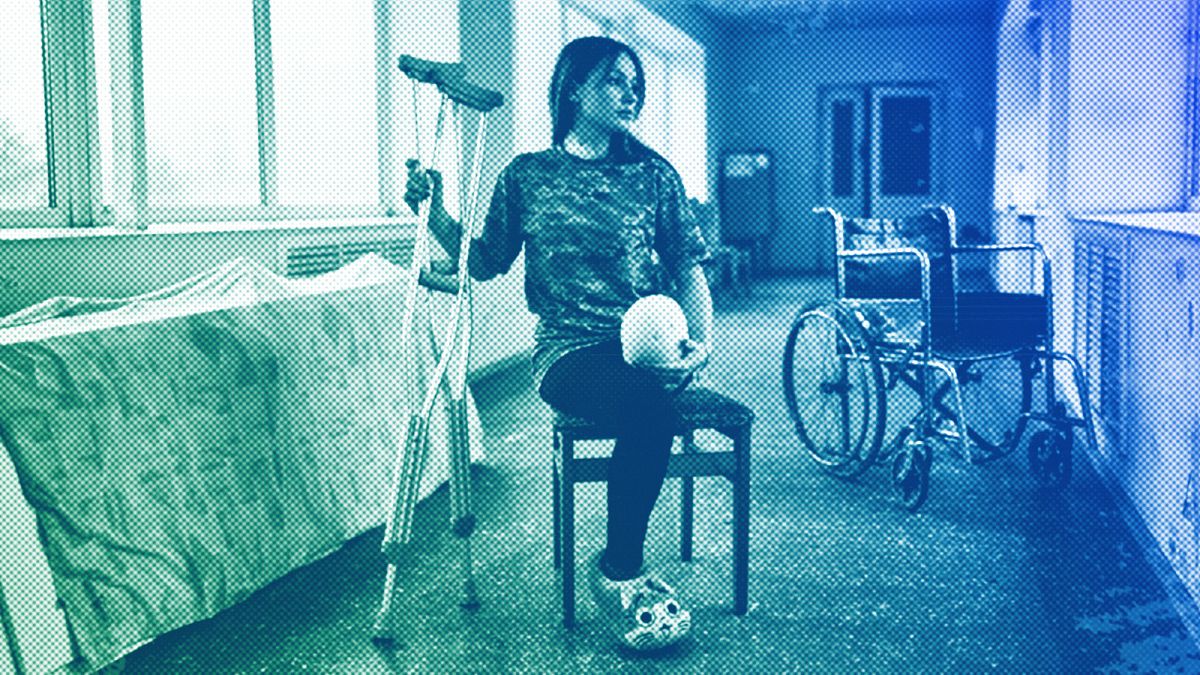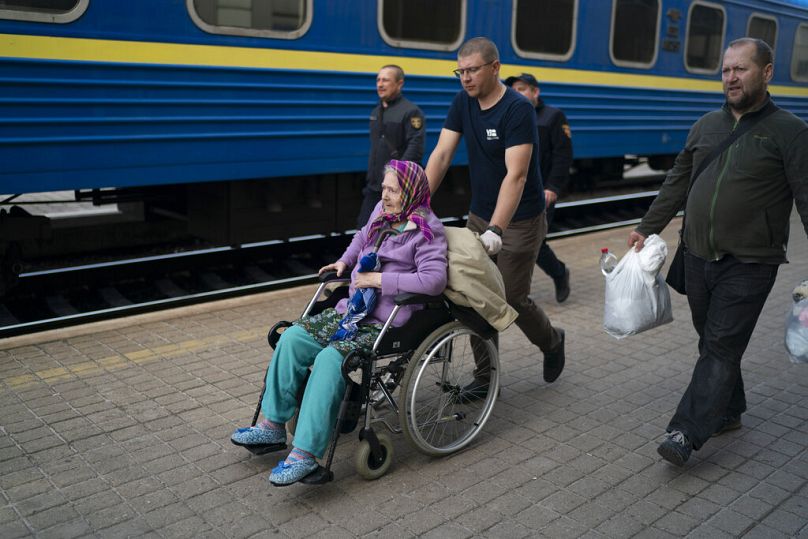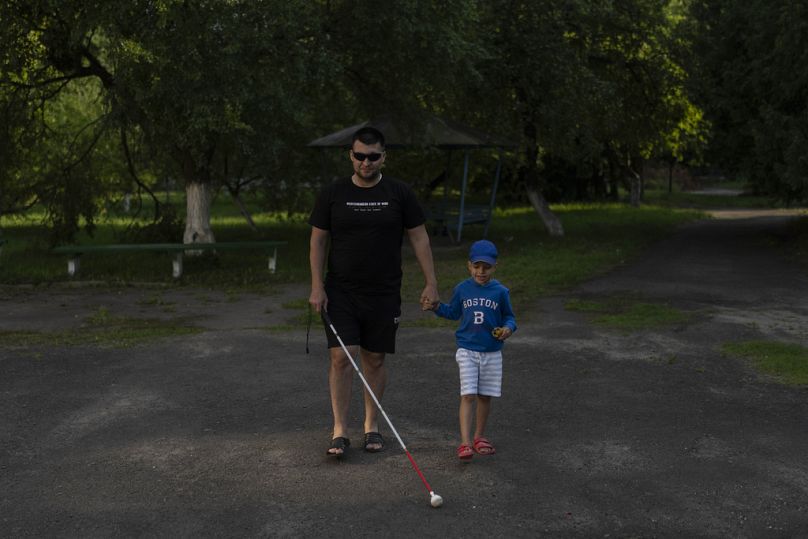Disability rights in Ukraine are a litmus test for democracy

When Ukraine emerges from conflict, the country has the promise to rebuild itself as a model for a free, fair, and inclusive society. Ensuring that the rights of people with disabilities are respected will be a major test of how well it succeeds, Virginia Atkinson and Yuliia Sachuk write.
Air raid sirens blare across Ukraine every day. The sound signals what has become a part of Ukrainians’ daily routine: run down the steps to the basement, shelter in place, and, as millions have, trek miles to shelter or to flee.
But for those with disabilities who can’t hear those signals, who can’t access bomb shelters, who can’t make it across the border or to a shelter — they continue to be left behind.
One woman’s family — all of whom are blind — never knew where the entrance to their apartment building’s basement was.
When the building owner told residents to shelter there, they were dismissed when they asked for directions.
This is just one scenario where people with disabilities could not access a shelter. In 2023, the Ukrainian Interior Ministry found that nearly 900 over 4,800 shelters were locked or in a state of disrepair; a majority of the remaining shelters are inaccessible to people with disabilities.
This past week, at the World Economic Forum in Davos, President Volodymyr Zelenskyy promoted a Ukrainian peace plan, urging his allies to remain committed to Ukraine “to build, to reconstruct, to restore our lives.”
As towns in Ukraine rebuild at this very moment, it is important to recognise that for people with disabilities, a one-size-fits-all playbook to survive and recover from the war does not exist.
When Ukraine emerges victorious, to thrive as an inclusive democracy, it must prioritise those being left behind right now.
Russia’s full-scale invasion made matters dire
Making the country work for its increased population of people with disabilities must not wait for the end of hostilities.
Around 2.7 million Ukrainians have disabilities, estimated by the State Statistics Service, though due to stigma and discrimination against self-identifying, this number is under-reported; a 2020 survey by Ukrainian disability rights NGO Fight for Right and the Kyiv International Institution of Sociology found that 16.8% of Ukrainians have a disability, a number that is rising daily during the conflict.
Before the full-scale invasion, Ukraine began to reform its social services to promote independence and a more rights-based approach to disability.
In 2021, the government adopted the Strategy for Barrier-Free Society, focusing on “empowering persons with disabilities to fully participate in society and ensure they can enjoy their fundamental rights.”
But when Russia went on a full-scale invasion of Ukraine in February 2022, those efforts came to a screeching halt.
Information disseminated to the public included crucial information, like curfews, where to seek shelter, and guidance on martial law.
Oleksandr, a man with a visual disability, couldn’t find out where to buy bread during the first months of the invasion, with information largely being inaccessible due to a lack of resources in sign language, large fonts, or audio or visual formats.
As people evacuated, some left behind loved ones who were older or had a disability. According to an Amnesty International report, 4,000 older Ukrainians with disabilities have been forced into state institutions.
As the Washington Post writes in a sobering report about internally displaced Ukrainians with disabilities, many of these institutions are in remote areas and violate international standards on access to independent decision-making for people with disabilities.
Children with disabilities are falling behind in their school lessons, with little to no support provided to families of children with disabilities.
Even getting to the border is not a guarantee of being allowed to cross. According to Fight for Right’s estimates, thousands of men with disabilities have been refused passage across the border.
The provisions of conscription state that persons with disabilities are not subject to conscription, but border guards are not sensitised to disability and often send men with disabilities away without any information on what documentation they need to cross.
International actors’ help needed
The challenges facing people with disabilities during the war point to the challenges that Ukraine will reckon with during reconstruction.
The number of people with disabilities has already skyrocketed throughout the war, many of whom are wounded soldiers. As a recent AP report outlines, wounded veterans need to be given resources to independently navigate the world.
For many soldiers, children, and adults — wounded and non-wounded alike — the trauma of seeing these atrocities will undoubtedly impact their mental and emotional health for the rest of their lives.
For Ukraine to thrive as an inclusive democracy, international actors need to prioritise identifying solutions to these issues.
The upcoming Ukraine Recovery Conference in Berlin provides an opportunity to focus attention on ensuring people with disabilities are meaningfully involved in Ukraine’s recovery and reform.
Buildings should be rebuilt in an accessible manner, institutions should be abandoned in favour of strategies for people with disabilities to live independently in the community, new laws and policies developed as part of the EU accession process should align with the UN Convention on the Rights of Persons with Disabilities, and the elections held when martial law is lifted should be accessible to voters with disabilities.
Many of the accommodations that can be applied are ones that we already use in our everyday lives, whether it be voice-to-text software on our phones or ramps that make buildings more accessible to people with physical disabilities or for parents with young children.
Democracy is at stake
We at the International Foundation for Electoral Systems (IFES) and Fight for Right are committed to doing our part.
Ahead of the 2020 local elections in Ukraine, the IFES team supported the Central Election Commission and organisations of persons with disabilities to design a QR code that allowed people with a smartphone to consume written content in Ukrainian sign language and audio format.
This voter education dissemination method was recognised with an Innovative Practice Award from the Zero Project at the UN in Vienna. The same can be done for any other piece of what could be life-saving information.
As Ukraine returns to ordinary democratic life, we will continue to work with Ukrainian partners to ensure that these standards are reflected in elections and that all Ukrainians have access to participate in the political process.
The global community has recognised, since the start of the full-scale invasion, that what is at stake is democracy.
When Ukraine emerges from conflict, the country has the promise to rebuild itself as a model for a free, fair, and inclusive society.
Ensuring that the rights of people with disabilities are respected will be a litmus test of how well it succeeds.
Virginia Atkinson serves as Global Inclusion Adviser at the International Foundation for Electoral Systems, and Yuliia Sachuk is Head of the Ukrainian Fight for Right NGO.
https://www.euronews.com/2024/01/19/disability-rights-in-ukraine-are-a-litmus-test-for-democracy



